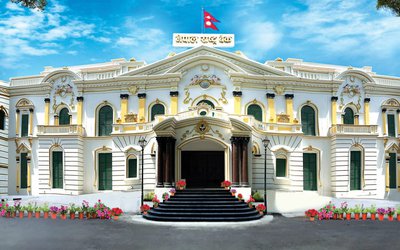
With faster rates of urbanization and construction of high-energy consumptive building structures, Nepal’s ambitious target to achieve net zero greenhouse gas emissions by 2045 is difficult to achieve. However, Nepal could achieve its ambitious target by taking certain technical and knowledge-based interventions.
Jointly launched by Minister of Urban Development Met Mani Chaudhary and Ambassador of European Union to Nepal Nona Deprez, Building Energy Efficiency in Nepal (BEEN) aims to support energy-efficient building through policy intervention, improving technical and business capacity and integrating MSMEs and supporting improving and retrofitting 200 buildings in 40 Municipalities of Bagmati, Lumbini and Gandaki Provinces.
As in all the programs, Ambassador of the European Union to Nepal Nona Deprez also keenly interacted with the experts and took a cursory visit to the BEEN marketplace organized to show the new brick technology and its impact to reduce carbon.
As the inauguration of the programs was delayed for half an hour, ambassador Deprez found time to query about the technology and how it will fit in Nepal.
Having records of supporting Nepal’s overall development programs by providing necessary financial and technical assistance, European Union once again joins in supporting to implementation of the BEEN Project which will be implemented by a consortium led by the University of Innsbruck, Austria.
Three international partners MinErgy Pvt Ltd, Nepal, Genentech Knowledge Solution Pvt, Ltd, India and Associacion Espanola de Normalizacion (UNE) Spain will work to implement the project.
Addressing the launching program, minister of Urban Development Met Mani Chaudhary thanked European Union for proving support in such an important area. He said that Nepal government believes that this project will contribute to making our building energy efficient and friendly to green development.
Ambassador of the European Union to Nepal Nona Deprez said that European Union has been taking efforts to implement a Green, Resilient and Inclusive Development (GRID) approach. “We are very happy to see the implementation of the project in Nepal which will contribute to achieving Nepal’s net zero emission target.”
European Union Ambassador Nona Deprez highlighted the need for implementing the New Urban Agenda, a “shared vision of urban future that should be transformative.” She stressed that “the European Union is committed to the science-based policy for cities based on reliable data and invited the Government of Nepal to use introduced urban data tools to lead policy making that will be for the benefit of all people in Nepal.”
She further noted the commitment of the European Union to support the advancement of DEGURBA and its application in all countries.
Ambassador of Austria to Nepal Katharina Wieser shared her views visually from New Delhi. She said that Austria and Nepal have many things in common saying that mountains bound us together. She said that Austria will provide the technology to make Nepal green.

Ambassador Wieser said that with proper green technology Nepal’s urban areas and cities can support its climate transition and improve energy-efficient technology.
Speaking during the opening of the workshop, Dr. Ram Kumar Phuyal from the Nepal Planning Commission highlighted the significant change in Nepal’s urban population – from 17 percent to 66 percent between 2011 and 2021, something that could have been influenced by changes in how urban areas are defined.
Dr. Phuyal holds the view that this project will support Nepal to achieve the goals SDG and Nepal’s commitment to the COP. He said that there needs to drastically decrease the energy consumption in the buildings.
“We should rely on data for our policy and decision-making processes, and BEEN presents us with a unique opportunity to advance towards this,” he said.
Deputy Mayor of Lalitpur Metropolitan City Manjali Shakya Bajracharya expressed the hope that the project will also incorporate Nepal’s own climate-friendly building technology in its program. She said that LMC will fully support the project during its implementation.
BEEN Project manager Daniel Neyer from the University of Innsbruck made welcome remarks highlighting the objective of the event. He said that the project will bring knowledge, technology and necessary skills to construct the climate-friendly and energy-saving buildings.
As Nepal is the fastest urbanizing country in South Asia, with growth rates up to 5 percent per year and the rapid growth combined with inadequate urban management and financing has led to decreased livability.
Executive Director of Alternative Energy Promotion Center (AEPC) Dr. Madhusudan Adhikari said that this project is compatible with the projects currently undergoing in Nepal aiming to reduce CO2.
BEEN Team leader of MinEergy Suyesh Prajapati in his brief introduction to the project highlighted the overall scenario of Nepal’s urbanization are the area for intervention to bring changes. He said that the project will support Nepal’s NDC and prioritizes low-carbon and resilient urban development.
As the NDC includes specific actions to move Nepal toward greener, more efficient and resilient cities, the country should facilitate integrated institutional architecture for urban development at the national, provincial, and local levels in the context of the transition from a unitary to a federal government structure.
The combination of rapid urbanization and unsustainable and energy-inefficient construction contributes to Nepal’s climate vulnerability and GHG emissions.
The government has identified the construction and building sector as a priority for future climate action. Nepal’s second NDC has set low-carbon and climate-resilient urban settlement adoption targets. The 2017 National Urban Development Strategy estimated an acute need for upgrading the housing stock, lending urgency to a shift to more resilient and green housing and construction.
In his vote of thanks, Vice-Rector of the University of Innsbruck Dr. Wolfgang Streicher expressed his commitment to sharing knowledge and technology with Nepal to make buildings energy efficient.
Despite promoting green buildings and energy-efficient solutions through the 2012 National Urban Policy and 2017 Urban Development Strategy, Nepal is yet come out with green building guidelines and building codes.
With rapid urbanization and the associated construction of buildings, the design and implementation of green building technology can immensely contribute. This BEEN aims to bring change in its four years of implementation.
Federalization has created additional municipalities and provinces that have further increased the need for a green building policy and legal framework; there is ample opportunity to ensure compliance through both fiscal incentives (taxes) and consistent monitoring. Substantial investments are allocated for the construction of public buildings to provincial and local governments.
The anticipated large-scale construction could help contribute to the government’s GHG emission target through greener construction that has a smaller environmental footprint in terms of carbon, water, natural resources, sustainable materials, and energy use.
The government has promoted green buildings and energy-efficient solutions through the 2012 National Urban Policy and 2017 Urban Development Strategy and is working on the preparation of green building guidelines and building codes.
With rapid urbanization and the associated construction of buildings, the design and implementation of a green building code and adoption and application of green building certifications (for example, for government and selected private buildings such as hotels) could help reduce emissions associated with construction, create green jobs, and support a climate transition for the construction sector.
Mainstreaming green development in the urban sector, particularly in construction, a major contributor of emissions, and urban planning, is critical to help Nepal achieve the NDC’s 2045 targets.
Only a few private sector companies explore affordable and resilient housing solutions. Private sector engagement is essential to accelerate the uptake of green solutions. This has relevance for the tourism sector, as policies could be set for the hospitality sector to adopt green building certifications as part of their green tourism efforts. To further expand the market, banks will need to provide financing, given the higher up-front cost
Nepal also needs to address gaps in the investment framework for urban municipalities, including the targeting of priority infrastructure investment requirements in strategic urban clusters. Finally, the government should support the emerging urban system by focusing on secondary cities as well as the Kathmandu Valley/
Nepal, a country whose urban population has increased nearly four-fold in a decade, are better equipped to provide harmonized nationwide urban planning and development with efficient energy. With the implementation of BEEN, Nepal will have the knowledge and technology to build more energy-efficient buildings.
- GOVERNOR POUDEL: Numerous Challenges Ahead
- May 27, 2025
- MONARCHISTS: Push For Political Reform
- May 27, 2025
- ECONOMY: Nepal To Grow 4.5 Percent
- May 21, 2025
- NC-UML COALITION: Facing Turbulence
- May 20, 2025
- PRO-MONARCHIST AGITATION: United Front
- May 19, 2025















